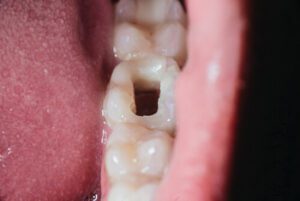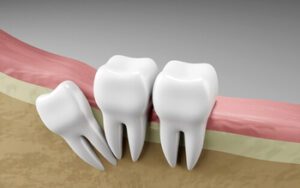When it comes to wisdom teeth, the journey is rarely smooth. These third molars, often appearing during late adolescence or early adulthood, can cause a range of dental problems when there isn’t enough space for them to erupt properly. From swollen gums to dry sockets and everything in between, understanding the signs, risks, and treatment options for an impacted wisdom tooth is crucial for maintaining oral health. Let’s delve into the world of impacted teeth with clarity and care.
What Is an Impacted Wisdom Tooth?
An impacted wisdom tooth is one that fails to erupt fully through the gum tissue, often because there isn’t enough room in the mouth. These teeth may remain completely hidden (fully impacted) or partially erupt through the gum line (partially impacted wisdom tooth). When left untreated, they can lead to various dental issues, including tooth decay, gum disease, and other complications.
Why Do Wisdom Teeth Become Impacted?
The primary reason wisdom teeth become impacted is the lack of enough space in the jaw. For most people, the mouth only accommodates 28 teeth, yet the arrival of four wisdom teeth brings the total to 32. This overcrowding can cause these molars to grow at the wrong angle or remain unerupted wisdom teeth altogether.
Other factors contributing to impaction include:
- Jaw size: Smaller jaws often don’t have room for third molars.
- Growth direction: Teeth may grow horizontally, vertically, or at an angle.
- Late eruption: Erupting in late adolescence or early adulthood can lead to complications with already-set teeth.
Recognising the Symptoms of an Impacted Wisdom Tooth
While some impacted wisdom teeth may not show obvious symptoms, others can cause significant discomfort and lead to further dental problems. Symptoms to watch for include:
- Pain or tenderness in the back of the mouth.
- Swollen gums or redness around the tooth.
- Difficulty opening the mouth or chewing.
- Bad breath and an unpleasant taste due to trapped food or bacteria.
- Gum infections, such as abscesses near the tooth.
- Pressure or discomfort as the wisdom tooth pushes against nearby teeth.
The Risks of Leaving Impacted Wisdom Teeth Untreated
Leaving an impacted tooth untreated can lead to a host of complications, including:
Tooth Decay and Cavities
The position of an impacted or partially erupted wisdom tooth makes it hard to clean. Food particles and bacteria easily accumulate, leading to decay in the wisdom tooth or even in the second molar next to it.
Gum Disease and Infections
Impacted teeth can cause infections in the gum tissue, resulting in swelling, pain, and abscesses. Chronic infections can further escalate into gum disease, compromising the health of other teeth.
Damage to Other Teeth
An impacted tooth pressing against other teeth can lead to misalignment or erosion, necessitating orthodontic treatment or further dental procedures.
Cysts and Tumours
A fully impacted wisdom tooth can sometimes form a cyst around the tooth’s sac, which can damage the surrounding bone and teeth.
Diagnosing Impacted Wisdom Teeth
A dentist will typically diagnose impacted wisdom teeth using an X-ray. The X-ray helps determine the tooth’s position, angle, and potential risks to nearby structures, such as the jaw or other dental problems.
Treatment Options for Impacted Wisdom Teeth
Once diagnosed, treatment depends on the severity of the impaction and the patient’s preference. Here’s a breakdown of treatment options:
Surgical Removal of Impacted Wisdom Teeth
Most cases require wisdom tooth extraction, especially if the tooth causes pain, decay, or infection. The procedure may involve:
- Local anaesthetic to numb the area.
- General anaesthetic for complex cases or surgical removal requiring bone cutting.
- Careful removal to avoid damage to the surrounding gum tissue, bone, or nerves.
Retention and Monitoring
In some cases, dentists may recommend retaining the wisdom teeth if they are not causing immediate problems. Regular check-ups and systematic reviews can help identify potential complications before they arise.
Recovery After Wisdom Teeth Removal
Healing after molar removal typically takes one to two weeks. Here’s what to expect:
- Blood clot formation: Critical for healing; avoid disturbing the area.
- Pain management with prescribed medication.
- Monitoring for complications like dry socket, where the clot dislodges.
- Soft foods and gentle oral care to promote recovery.
Can Impacted Wisdom Teeth Be Prevented?
While most people cannot prevent their wisdom teeth from becoming impacted, early intervention at a younger age can help prevent future problems. Regular dental visits and early X-rays allow for timely monitoring of third molars, ensuring treatment options are explored before symptoms escalate.
Surgical Removal Versus Retention: What’s Best?
The decision between surgical removal versus retention of impacted wisdom teeth depends on factors such as:
- Severity of impaction (e.g., vertical impaction, horizontal impaction).
- Risks to nearby teeth and structures.
- The patient’s comfort and long-term oral health goals.
Dental professionals often recommend extraction to prevent future problems like tooth decay, misalignment, or gum infections.
Tips for Eating During the Healing Process
- Use a Food Processor – If you’re craving a specific meal, consider using a food processor to make it softer.
- Rinse Gently After Eating – Keep food particles from settling in the extraction wound by gently rinsing with a saline solution.
- Avoid Straws – Sucking on a straw creates suction that may dislodge blood clots, causing a condition called dry socket, which can be very painful.
Tips for Maintaining Oral Health During Recovery
Keeping your mouth clean without disturbing the healing site is essential. Here’s how to maintain good oral hygiene without risking complications:
- Rinse Gently with Warm Salt Water: A saltwater rinse helps keep the extraction site clean and promotes healing. Start rinsing 24 hours after surgery, and be gentle.
- Brush Carefully: Avoid brushing directly over the extraction sites, but continue brushing the rest of your teeth to prevent bacteria build-up.
Types of Impaction: Understanding the Different Scenarios
Wisdom teeth impaction can vary greatly, and knowing the type of impaction is crucial for determining the best course of action. Here are the primary types:
- Vertical Impaction: The tooth is positioned upright but doesn’t fully erupt through the gum line due to insufficient space. This type might not always require extraction unless it leads to pain or pressure.
- Horizontal Impaction: One of the most problematic scenarios occurs when the wisdom tooth grows sideways, pressing into the adjacent second molar. This can lead to severe damage to neighbouring teeth and often necessitates surgical removal.
- Angular Impaction: This occurs when the tooth grows at an angle. Subtypes include:
- Mesial impaction: The tooth tilts forward toward the front of the mouth.
- Distal impaction: The tooth tilts backward toward the throat.
Each type of impaction poses unique risks and challenges, requiring tailored treatment approaches.
Wisdom Teeth and Orthodontic Treatment
Impacted wisdom teeth can disrupt orthodontic work, making them a concern for patients with braces or clear aligners. Here’s how:
- Crowding: Impacted or erupting wisdom teeth can push against adjacent teeth, potentially undoing the alignment achieved through orthodontics.
- Planning Ahead: Many dentists recommend extracting wisdom teeth before or during treatment to avoid complications.
- Post-Orthodontic Impact: Even after braces or aligners, unerupted wisdom teeth can shift teeth out of alignment, requiring further orthodontic care.
Early monitoring by a dentist can prevent these complications and ensure a smoother orthodontic journey.
Wisdom Teeth and General Health
Your wisdom teeth don’t just affect your mouth—they can impact your overall health. Here’s how:
- Chronic Infections: Untreated gum infections near impacted wisdom teeth can lead to systemic inflammation, potentially affecting other parts of the body.
- Heart Health Links: Gum disease associated with impacted teeth has been linked to cardiovascular issues.
- Nutrition Impact: Pain or difficulty chewing due to impacted teeth can result in poor dietary choices, affecting overall nutrition.
Treating impacted wisdom teeth promptly can protect not only your smile but also your overall well-being.
Cost Considerations for Wisdom Teeth Removal
The cost of wisdom teeth removal varies based on several factors:
- Severity of Impaction: Simple extractions cost less than surgical procedures involving bone cutting.
- Anaesthetic Type: General anaesthetic adds to the overall cost.
- Location and Provider: Fees differ between clinics and regions.
Discussing financing options with your dentist can help manage the costs.
FAQ: Your Post-Surgical Questions Answered
Q: When can I start eating solid foods?
A: Generally, you can start introducing solid foods about a week after surgery, but follow your dentist’s advice, as healing times can vary.
Q: Can I eat crunchy foods like chips after a week?
A: It’s best to avoid crunchy foods for at least two weeks to ensure the extraction site has healed properly.
Q: Why should I avoid caffeinated drinks?
A: Caffeinated drinks like coffee and tea can dehydrate you and may slow down the healing process, so it’s best to steer clear until your dentist says it’s safe.
Q: Can I eat spicy foods a few days after surgery?
A: Spicy foods should be avoided as they may irritate the extraction site. Wait at least a week or until the wound is less sensitive.
Q: How long should I stick to a soft food diet?
A: Most people need to follow a soft food diet for the first week or two after surgery. Your dentist will let you know when it’s safe to gradually reintroduce more solid foods based on your healing progress.
Q: Is it okay to eat dairy products like yoghurt or milkshakes?
A: Yes, dairy products are generally safe and offer a soft texture and protein to support healing. However, some people may experience mild nausea from dairy if they are on pain medications, so listen to your body.
Q: What should I do if food gets stuck in the extraction site?
A: Gently rinse your mouth with a saltwater solution to dislodge any food particles. Avoid using force, and do not poke the area with fingers or utensils. If food remains lodged, consult your dentist for safe removal methods.
Q: Can I eat foods with seeds or small grains?
A: It’s best to avoid foods with seeds or small grains, like chia seeds or rice, for the first couple of weeks. These can easily get lodged in the extraction site and may cause irritation or infection.
Q: When can I start brushing my teeth normally?
A: You can resume gentle brushing the day after surgery, avoiding the extraction sites. After about a week, most people can return to their usual brushing routine, but be cautious around the healing areas.
Q: How can I manage pain when eating?
A: Stick to cool or room-temperature foods initially to avoid discomfort. If needed, take over-the-counter pain relievers as directed by your dentist before meals, and avoid foods that require extensive chewing.
Q: Can I chew gum during recovery?
A: Avoid chewing gum for at least two weeks after surgery. The pressure of chewing may irritate the extraction site, and gum can leave particles that might get stuck in the wound.
Q: Can I eat ice cream after surgery?
A: Yes, ice cream can be soothing and easy to eat right after surgery. Just be sure to avoid any ice cream with hard or crunchy mix-ins, which could irritate the surgical site.
Q: What is a dry socket, and how can I prevent it?
A: A dry socket occurs when the blood clot protecting the extraction site becomes dislodged, leading to intense pain. To prevent it, avoid straws, smoking, and vigorous rinsing in the first week after surgery.
Debunking Myths About Wisdom Teeth
Here are some common misconceptions about wisdom teeth and the facts to clarify them:
“Everyone needs their wisdom teeth removed.”
- Truth: Not all wisdom teeth require extraction; some grow in without issues.
“Pain is the only indicator of a problem.”
- Truth: Impacted wisdom teeth can cause silent damage to nearby teeth and gums.
“Removing wisdom teeth is dangerous.”
- Truth: With modern techniques and experienced professionals, the risks are minimal.
Final Thoughts: Taking Action for Healthy Wisdom Teeth
Wisdom teeth erupt in a unique phase of life, often bringing challenges that require careful attention. From partially impacted wisdom teeth to fully impacted wisdom teeth, addressing these issues promptly with the help of a dentist can save you from long-term complications.
If you’re experiencing symptoms like pain, swollen gums, or bad breath, don’t hesitate to consult a dental professional. Early treatment can make all the difference in maintaining your smile’s health and comfort.
Contact Balmoral Dental Centre at (07) 3113 9789 today to learn more about your treatment options and ensure your wisdom teeth don’t stand in the way of a healthy mouth. Whether it’s wisdom tooth extraction, ongoing care, or a routine check-up, taking action now can help you avoid potential risks and keep your smile bright.
Note: Any surgical or invasive procedure carries risks. Before proceeding, you should seek a second opinion from an appropriately qualified health practitioner.
References
Mayo Clinic. (n.d.). Wisdom tooth extraction. Retrieved from https://www.mayoclinic.org/tests-procedures/wisdom-tooth-extraction/about/pac-20395268
WebMD. (n.d.). Dry socket: Symptoms and treatment. Retrieved from https://www.webmd.com/oral-health/dry-socket-symptoms-and-treatment
Colgate. (n.d.). How to brush your teeth properly. Retrieved from https://www.colgate.com/en-us/oral-health/brushing-and-flossing/how-to-brush-your-teeth-properly
Cleveland Clinic. (n.d.). Impacted wisdom teeth. Retrieved from https://my.clevelandclinic.org/health/diseases/22296-impacted-wisdom-teeth
WebMD. (n.d.). Gingivitis and periodontal disease. Retrieved from https://www.webmd.com/oral-health/gingivitis-periodontal-disease

